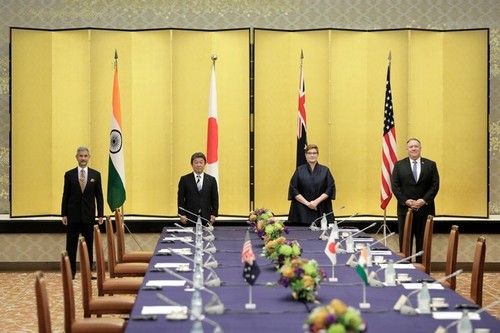 (From left) The foreign minister of India, Japan, Australia, and the US, known as the Quad Group, meets in Tokyo, October 6, 2020 (Photo: AFP) (From left) The foreign minister of India, Japan, Australia, and the US, known as the Quad Group, meets in Tokyo, October 6, 2020 (Photo: AFP) |
3 years ago, at the Asia-Pacific Economic Cooperation Forum, US President Donald Trump proposed building a free and open Indo-Pacific region. Last year, the US State Department released a 32-page report, saying the US vision and approach are closely linked with Japan’s Free and Open Pacific Plan, India's Act East Policy, Australia's Indo-Pacific Plan, South Korea's New Southern Policy and Taiwan's New Southbound Policy.
The Quad Foreign Ministers' meeting is the latest attempt by the four countries in to affirm a consistent and clear vision of an Indo-Pacific region, that is free, open, and rules-based.
Rule of law: a consistent, clear stance
During the face-to-face meeting in Tokyo, Japan’s Foreign Minister Motegi Toshimitsu said that with the world order under challenge and COVID-19 pandemic worsening, Japan, Australia, India, and the US share a common view of an international order based on accepted principles. At a September 29 press conference, Mr. Motegi said it is important to involve as many countries as possible who share basic values and common rules concerning developments in the South China Sea (called the East Sea in Vietnam) and the East China Sea.
One day before the Quad Group’s meeting, the US State Department issued a statement highlighting a shared US-Japan vision of a free and open Indo-Pacific region. Washington vowed to work with Tokyo to achieve their shared goals using a law-based approach. The same day, Japanese Prime Minister Suga Yoshihide and French President Emmanuel Macron agreed to strengthen cooperation toward a free and open Indo-Pacific. During a 25-minute phone call, the two leaders agreed that they share fundamental values of freedom, democracy, and the rule of law.
Late last month, an Indian Foreign Ministry’s statement reaffirmed the commitment to an Indo-Pacific which is free, open, prosperous, inclusive, and based on shared values and principles and respect for international law.
World concern and the ASEAN position
Following Tuesday meeting, Foreign Minister Motegi told reporters that the free and open Indo-Pacific diplomacy that Japan initiated has spread to the wider world at an unprecedented rate.
In June last year, ASEAN approved a "Vision of the Indo-Pacific" at its 34th ASEAN Summit, a strategic step to maintain ASEAN's centrality in ensuring peace, security and stability in Southeast Asia as part of a free, open, rules-based Indo-Pacific region. India's Ministry of Foreign Affairs said the Quad's diplomats voiced their willingness to work with ASEAN and all other countries to achieve a common vision of the Indo-Pacific. The US, Japan, India and Australia all reiterated their strong support for ASEAN-led mechanisms like the East Asia Summit (EAS).